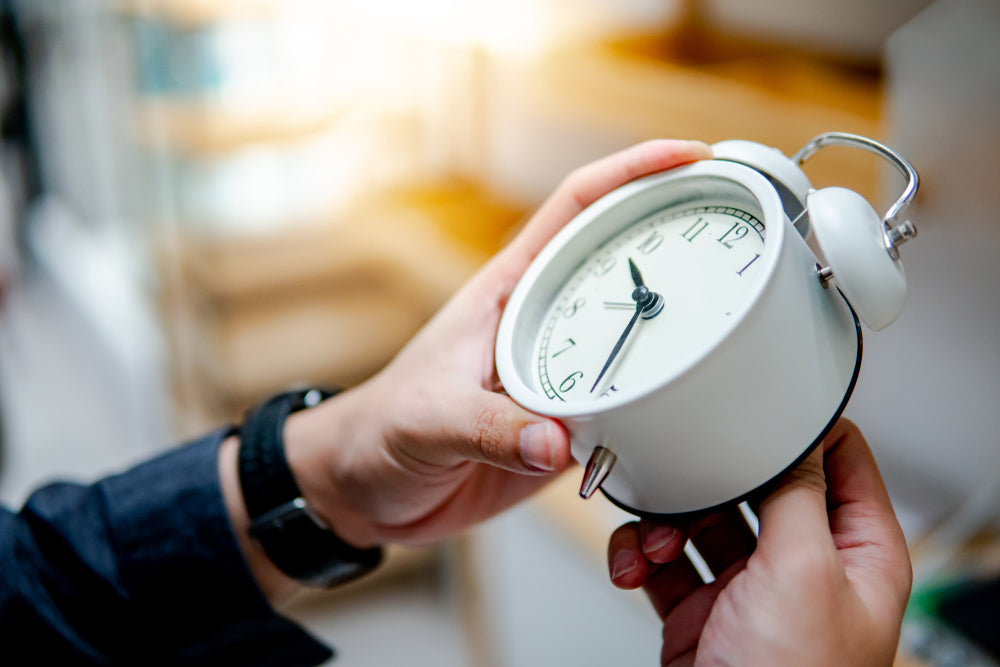Free U.S. Shipping On Orders Over $150

How to Keep Daylight Saving Time From Ruining Your Sleep
Posted on
It can take weeks to get over the sleep disruption caused by daylight saving time. Over that period, many people struggle with daytime sleepiness, fatigue, higher stress levels and other effects of sleep deprivation.
But that doesn't have to be the case. Here’s how to go through the spring and autumn time change without letting DST ruin your sleep. But first, a quick recap of how DST affects sleep.
How Does Daylight Saving Time Affect Your Sleep?
When we adjust our clocks forward at the start of spring, we lose one hour of sleep on that first night. That doesn't seem like a big deal. After all, we continue with the usual 24-hour days after that, so you don't lose any more hours of sleep after the first night.
But in reality, the effects of DST on sleep go beyond that first night. That’s because you don't just lose an hour of sleep the first night, DST also changes your sleep and wake times. No one tells your body that your usual 10pm bedtime is now 11pm.
This interferes with the natural wake-sleep rhythm of the body, what we call the circadian rhythm. Before your internal circadian clock has caught up with the actual real world clock, you are going to experience some disruption to your sleep.
Insomnia is especially common, resulting in chronic sleep deprivation. This, in turn, affects your physical and mental state during the day, causing things like fatigue, loss of concentration, poor decision making and irritability.
Sleep deprivation can also affect your health, increasing your risk of heart disease, type 2 diabetes, depression and other health conditions. DST may also be responsible for an increase in fatal car accidents around this period.
So while on paper, you lose an hour of sleep only on the day of transition (and gain it back at the end of DST in fall), many people lose a significant amount of sleep for days or weeks following the first day of DST.
6 Ways to Keep Daylight Saving Time From Ruining Your Sleep
1. Start Your Own DST Earlier
If you are reading this after DST has already started, then it’s too late. But you can prepare for the next disruption when we move the clocks back during fall.
The best way to prepare for DST is to start your own daylight saving time a couple weeks earlier than the official one. Start by going to bed 15 minutes earlier. Push it 15 minutes back every 2-3 days so that by the time the official DST begins, you are already sleeping an hour earlier than usual. That also means you’ll be waking up an hour earlier than you are used to.
You may still experience some sleep disruption from the time change, but you will adapt pretty quickly. If you are lucky, you’ll probably experience no disruption at all.
Repeat the same for the fall time change when DST ends. A couple weeks before we move the clock back, push your bedtime forwards 15 minutes every couple days until you are sleeping and waking up an hour later than usual.
2. Get Some Sun First Thing In The Morning
You need to get your circadian rhythm back in sync as quickly as possible to reduce sleep problems. Your circadian clock uses sunlight in the morning as a signal to get your body fully awake and energized.
So getting some sunlight as soon as you wake up is a way to let your body know that the clock has changed. It also helps drive away sleepiness and fatigue.
3. Take A Daytime Nap
If daytime sleepiness strikes, don’t fight it. If you are able to, take a quick 15-30 minute nap. This will do two things.
- It will help reduce sleep debt and the effects of sleep deprivation. After a nap, you’ll feel more energized, more focused and less irritable.
- It can help you sleep better at night, which will help you overcome the effects of DST quicker.
Two things to keep in mind when it comes to naps. One, keep it at 30 minutes or less, otherwise it can be bad for your sleep at night. Two, don't snap too late in the day as it can make it harder to fall asleep later. Early afternoon is best.
4. Maintain a Sleep Routine
Your circadian rhythm is already out of sync. An unpredictable sleep routine where you sleep at a different time each night will make things worse.
Maintaining consistent sleep and wake times can help you get over DST-related sleep disruption a lot quicker.
5. Stay Active
Similar to getting some sunshine, exercise can help adjust the circadian clock especially if you do it in the morning. But even if you do it later, it will help you sleep better at night and overcome insomnia caused by DST.
6. Don’t Make Your Sleep Worse
Finally, watch your sleep hygiene. Don't do anything that will only worsen your sleep problems like drinking caffeine too close to bedtime, taking too much alcohol, using your phone in bed and so on.
If anything, you should do more things to improve your sleep like working out, making your bed extra comfortable (including getting soft breathable sheets), dealing with any noises in and around your bedroom and having a relaxing bedtime routine.
Quick links
Contact
6063 Hudson Road #160
Woodbury, MN 55125
Yo@hercLeon.com
Leave a comment: